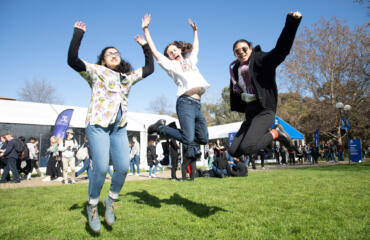‘I came to Australia as a 10-year-old in October 1989 when I emigrated from Yugoslavia with my mother. Six months later the country I came from had ceased to exist.
The next year my mother got ill and while she was in hospital I was placed into foster care. The fact that I went on to study and do a PhD had a lot to do with the foster parents I ended up with.
They were both PhD students at the time and took me to many university seminars and invited all kinds of academics over for dinner.
‘I really wanted to understand why ethnic conflict happened and how you could fix it.’
I was exposed to a really interesting intersection of people. It was an amazing formative experience.
So when I turned to do my own research, I wanted to make sense of the war in Yugoslavia that affected me personally. In some ways it was to keep connected with the place I left as a child.
I had never functioned in that society as an adult and my research offered an opportunity to go and make some new place for myself there.
I really wanted to understand why ethnic conflict happened and how you could fix it.

This became the focus of my thesis. How could we reconcile the Bosniaks, Croats and Serbs so they could go from shooting at each other to being able to live together again?
A lot of people in the region were very, very uncomfortable with the term reconciliation because they felt it meant sweeping things under the carpet. They weren’t willing to do that; they felt they shouldn’t have to.
At the same time, an entire industry had developed around post-conflict reconstruction where international organisations would go into a situation with all sorts of models to “fix” the problem.
From talking to local people, I noticed that this was met with a lot of resentment because international elites and politicians imposed the whole process.
They said: “You guys need to fix yourselves. We’ll tell you how by applying our models.”
‘So music became this proxy: if you were listening to Yugoslav rock music in the mid-to-late ’90s there was a pretty good chance you weren’t a nationalist.’
They often knew very little about the society they were trying to fix. On the other hand, I had observed that popular culture was one of the rare places where people were interacting across inter-ethnic lines.
The ’90s saw a concerted effort to boycott each other’s products, particularly in Croatia toward Serbian products, music, television shows and books.
But in 1998, when Napster (an online music service) was big, I was curious to see if I could find any Yugoslav music from the ’70s and ’80s. The only place you could find it was either on illegally copied tapes sold on the black market or online.
The people I was downloading it from, who knew nothing about me, started sending me messages about the political situation.
They made assumptions about my political stance because of the music I was downloading. And they were kind of correct!
So music became this proxy: if you were listening to Yugoslav rock music in the mid-to-late ’90s there was a pretty good chance you weren’t a nationalist.
‘From my own experience and research I’ve learned that family s bigger than blood, and that children are more resilient than we think.’
I had encountered the negative reactions to the imposed reconciliation programs at the same time as becoming aware of this private consumption.
It led me to ask: “Why isn’t that reconciliation?” You see, academics often focus on the big picture stuff.
A lot of the literature dealt with the top-end; what were the politicians saying, what were the legal and political structures?
My argument was that while the structural level is still important, change sometimes happens from the bottom, through the things people do every day.
I argued in my thesis that these constitute “indirect reconciliation” because they have the effect of normalising the relationship. It works because people don’t recognise it as reconciliation.
For example, when did the French and English have a “reconciliation process”? When did they agree on their shared history of the conflict? They still don’t agree.
But it’s OK. They have developed a normal two-state relationship. Or what about the Canadians and the Americans, who fought a war in 1812? They didn’t have a reconciliation process, but now have an excellent relationship.
Through this process, as a scholar and as a student, I realised that I thought people needed to have a neat conversation and come to an agreement. Standing at this end I’m not sure that’s right. I think those indirect processes are what sometimes happens which is how societies deal with conflict.
They find ways not to address the problems directly but address them in a roundabout way. In 2013, I moved to Canada to be with the man that I have since married. He is Serbian and emigrated to Canada in 1993. We are expecting our first baby in July.
Our unborn child will not easily fit into any ethnic or national categories given we are a Croatian-Australian and Serbian-Canadian family and that’s OK. From my own experience and research I’ve learned that family is bigger than blood, and that children are more resilient than we think. Coping with and overcoming something can be a really empowering experience.’
Iva Pauker’s thesis is titled: “Between Despair and Utopia: Signposting reconciliation after the Yugoslav wars”.
* My PhD is an irregular series in which The Citizen speaks with recent Melbourne University PhD graduates.


